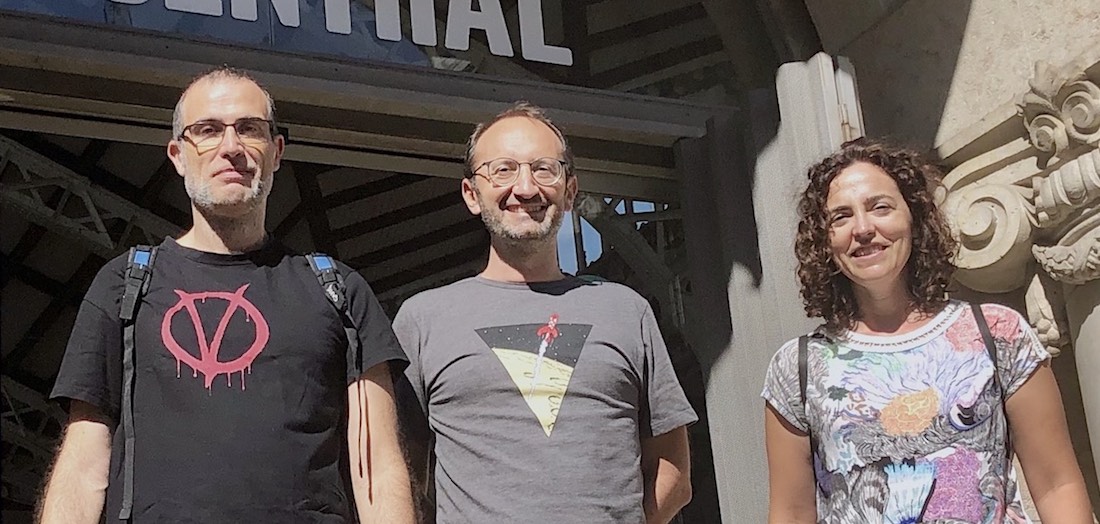Jordi Muñoz, Gustau Camps-Valls, María Piles
The European Commission (EC) has resolved to finance the DeepCube project aimed at tackling, through Artificial Intelligence and Remote Sensing, urgent problems caused by climate change in Europe and the Mediterranean. Coordinated by the Athens National Observatory, the project is part of a consortium formed by 12 research teams from different European public and private centres, including the Image Processing Lab (IPL) of the University of Valencia.
A new project with relevant participation from the University of Valencia has just been selected by the European H2020 framework program. DeepCube – as it is called – will try to provide ambitious solutions to problems involving a high environmental and social impact, from the early detection of droughts, fires or volcanic eruptions to the monitoring of migrations to study their causes, among others; and will contribute to improving the understanding of the processes that the Earth undergoes in the current context of climate change. Advances in Artificial Intelligence (AI) and semantic web (web 3.0) will allow researchers to exploit the large volume of remote sensing data produced by the Copernicus program (CE-ESA) of Earth observation and monitoring.
“Climate change is leading to an accumulation and intensification of various climatic extremes and the Mediterranean is a clear example of this, with significant droughts, heat waves and the appearance of so-called medicanes, a type of extratropical cyclone, similar to a hurricane, which is increasingly virulent in the Mediterranean area. The effects of these changes are substantial and affect, for example, agriculture, inland waterways and consequently nutrition and energy supply, “says María Piles, expert in remote sensing and telecommunications and member of the team of the University of Valencia”. We want to bring new AI algorithms and Copernicus data to a practical dimension to try to anticipate droughts and improve mitigation measures and adaptation to future extreme events”, adds the researcher.
DeepCube will use advanced ICT technologies, such as Earth System Data Cube, Semantic Cube, the Hopsworks deep learning platform and a state-of-the-art visualisation tool adapted for linked data from Copernicus, that will extract value from the large volume of data of the said European system of observation of the earth. “AI technology is mature today, but a decisive leap is needed to put it into practice in the face of the real problems that Europe and the Mediterranean are suffering: droughts, migrations, climatic extremes or the enormous pressures we are exerting on such a vulnerable environment and that they have important socioeconomic implications”, says Jordi Muñoz, researcher at the Image and Signal Processing (ISP) group at the IPL.
The algorithms to be developed in DeepCube, largely the responsibility of the ISP group of the University of Valencia, will extrapolate the standard algorithms in various directions, such as the creation of new versatile neural networks, interpretable and compatible with all types of data and sources; all issues from which the University team has been producing results for several years through different European projects. Capacities will be shown in five real case studies and in fields ranging from tourism to the environment to humanitarian aid, among others.
The H2020 DeepCube Project, which the EU has decided to finance with 4 million euros, has obtained the best score of the 28 subsidised in this call H2020-SPACE-2020, Activity DT-SPACE-25-EO-2020.
The consortium established for this project is formed by 12 teams from five countries – Greece, Germany, Italy, Spain and Sweden. The researchers belong to the Max Planck Institute for Biogeochemistry (Jena, Germany), the University of Athens, the University of Valencia, the Athens National Observatory – coordinator of the project – and the companies Logical Clocks, TRE ALTAMIRA and MURMURATION, among others. The Valencian group will develop learning and comprehension algorithms transversal to the different case studies.
“The project is not just a conceptual test of what can be achieved by combining machine learning and remote sensing. In this project we want to go further and put AI in the European context with relevant applications, such as the detection of droughts and heat waves, migrations due to climate change, or how to optimise processes and resources for growth and sustainable tourism, for example”, concludes Gustau Camps-Valls, professor of electronic engineering and holder of two ERC scholarships, a Consolidator and a Synergy grant for the advancement of AI in Earth and Climate observation.


